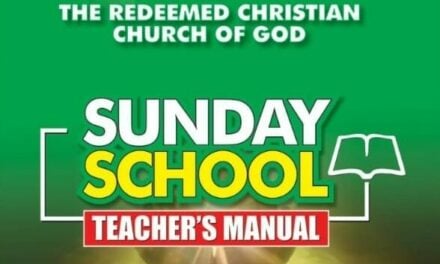
RCCG YAYA Sunday School Teacher Manual 10 November 2024 Lesson 11: Consecration
Click HERE for Previous RCCG Sunday School Manual
TOPIC: Consecration (RCCG Sunday School Manual For Young Adults And Youths (YAYA)
OPENING PRAYER: Lord Jesus, let my life be consecrated to You. (Scroll down for RCCG YAYA Sunday School 10 November 2024)
PREVIOUS KNOWLEDGE: The teacher should allow the Assistant teacher to review the lesson for the previous week.
MEMORY VERSE: “I beseech you therefore, brethren, by the mercies of God, that ye present your bodies a living sacrifice, holy, acceptable unto God, which is your reasonable service. ” – Romans 12:1 (NKJV).
BIBLE PASSAGE: Revelation 1:5-6 (KJV)
5 And from Jesus Christ, who is the faithful witness, and the first begotten of the dead, and the prince of the kings of the earth. Unto him that loved us, and washed us from our sins in his own blood,
6 And hath made us kings and priests unto God and his Father; to him be glory and dominion for ever and ever. Amen.
Also Read:
– RCCG Sunday School Teacher Manual 10 November 2024 – Avoid Strife
– RCCG Sunday School Student Manual 10 November 2024 – Avoid Strife
INTRODUCTION: Consecration from its Hebrew root “millu’” means a dedicatory sacrifice. This refers to persons or things being separated or belonging to God. They are sacred and set apart for the service of God. In the Old Testament era, the race of Abraham and the tribe of Levi were consecrated to God (Exodus 13:2, 12, 15; Numbers 3:12). In the New Testament, Christians are regarded as being consecrated to the Lord (1 Peter 2:9). In consecration, we have our roles as Christians while God has His roles.
LESSON AIM: To teach students about the act of consecration
TEACHING OBJECTIVES: At the end of this lesson, students should be able to:
a. Describe and define consecration.
b. Understand the believers’ role in consecration.
c. Identify God’s role in the same.
TEXT REVIEW: Revelation 1:5-6.
As touching consecration, the above passage captures the absolute perfect service of our Lord Jesus Christ through the shedding of His blood to bring us out of all filth and condemnation to be fit to reign as king and serve as priest before our God…………………………………….V5 & 6.
TEACHING METHOD: The Question and Answer Teaching Method.
LESSON OUTLINES:
- Our Role
- God’s Role
1. OUR ROLE
Teachers should guide and give convincing explanations to students with the questions, answers and scriptures below:
A. Question: Why Consecration?
Answer: Consecration plays an important role in our growth as God’s children.
B. Question: Do we have any part to play in consecration?
Answer: Yes. Our part is the practical side of separating ourselves from sinful living (Romans 12:1; 2 Corinthians 6:17).
C. Question: Must all believers be consecrated?
Answer: Yes. This is because consecration is not optional for believers since we are all God’s priests (1 Peter 2:9; Revelation 1:6).
D. Question: So what do we do?
Answer: We dedicate our hearts to God:
i. We must make a conscious, willing decision to surrender our soul, mind, heart, and body to God (Matthew 16:24-25; Hebrews 10:22).
ii. Also since consecration is a personal choice, it is important to reflect on and search out the true motive of our hearts (Jeremiah 17:10; Philippians 4:8).
iii. We must separate ourselves from things the world promotes when the Holy Spirit convicts us that those things are wicked (1 John 2:16).
iv. We must draw closer to God through His word (James 4:8).
E. Question: Are there people in the Bible who were consecrated?
Answer: People who exhibited consecration in the Bible include:
i. Caleb and Joshua (Numbers 32:12).
ii. Josiah and his subjects (2 Kings 23:3; 25).
iii. Apostle Paul (Philippians 3:7-8).
iv. Jesus is the perfect example of consecration, in that He faithfully carried out God’s will and served Him in absolute perfection (John 15:13; Galatians 1:4; 1 John 3:16).
CLASS ACTIVITY 1: Although believers’ consecration is a work in progress, students should share their consecration stories so far.
2 GOD’S ROLE
A. Question: What is God’s role in the consecration of believers?
Answer: God’s part of our being consecrated is to:
i. prepare us for His use by making us holy (Deuteronomy 7:6).
ii. In being prepared for holy use, God also prepares our body for use in the ministry (Ephesians 4:7).
B. Question: How does He achieve it in the life of the believers?
Answer:
i. As Christians, God has already cleansed us on the inside and made us holy through His truth (John 15:3).
ii. The mission of Jesus was to sanctify believers (John 17:19). Paul said Christians are called to be “saints,” and their sanctification comes through Christ (1 Corinthians 1:2; Romans 1:7).
CLASS ACTIVITY 2: Students should discuss the possible outcomes a believer who refuses consecration may face in his/her Christian life.
CONCLUSION: God uses sanctified vessels for His glorious purpose (2 Timothy 2:20-21). He can use you in a greater dimension.
EVALUATION: Mention two things a believer can do to become consecrated.
CLOSING PRAYER: Father, help me to detach from the world and serve You in total obedience all the days of my life in Jesus’ name.
ASSIGNMENT: State five (5) people consecrated unto God in the Bible (2X5=10 Marks).
SUNDAY SCHOOL HYMN
- O Sunday School, on the Lord’s day,
O how I love Thee well,
I am happy, it makes me glad
To rejoice at Thy birth. - O Sunday School, on the Lord’s day,
Thy friend friendship suits me well,
Both young and will sing Thy song,
We long for Sunday School. - O Sunday School, on the Lord’s day,
Christ was Thy first teacher,
The Holy Spirit, great teacher,
Does manifest in thee. - O Sunday School, on the Lord’s day,
This testimony is sure,
That God, the Father Almighty,
Poured His blessing on Thee - O Sunday School, on the Lord’s day,
Though the sun be so bright,
Or if the clouds be black with rain,
I’ll be in Sunday School. - O Sunday School, on the Lord’s day
I rejoice to see Thee,
Will thou pass over me today?
Without my being blest?




